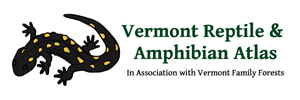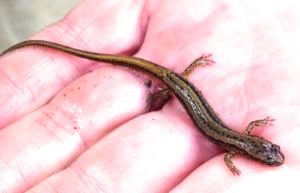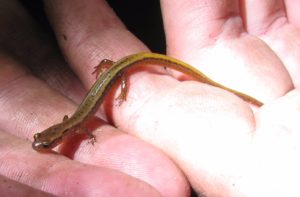Eurycea bislineata
Identification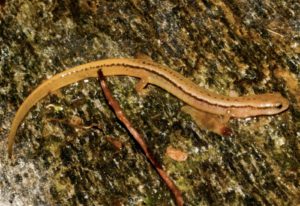
The Northern Two-lined Salamander is one of our three small, slender salamanders in Vermont, along with the Eastern Red-backed and the Four-toed Salamanders. Adults range from 3 – 5 inches long. They have a yellow-brown stripe down the middle of their backs. On either side of the stripe there are two thin black stripes that start at the eye and extend the length of their bodies. The underside of their tail is a bright yellowish-orange. All four of their legs are about the same size, slender and thin.
Northern Two-lined Salamanders attach their white eggs to the undersides of rocks in streams, springs, and seepage areas.
Get more detailed identification and life history information by downloading the chart here.
You can learn more about this species and see some video footage by checking out this clip from our Rattlers, Peepers & Snappers DVD or our video on stream salamanders in the Green Mountains.
Range/Habitat
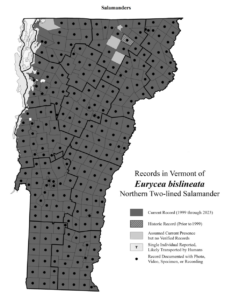
[ click image to zoom | download printable PDF ]

[ click image to zoom | download printable PDF ]
They prefer wet soil along small rocky streams, seeps, and springs. During the day they are quite easily found by flipping rocks and logs along the stream edge. They may travel a couple hundred feet away from these areas when the ground is wet. As adults, they are able to climb a couple feet up a tree or fern. They are found statewide.
Status
Northern Two-Lined Salamanders have a state natural heritage rank of S5 (common). Please report sightings of this species in Vermont if you have not reported them within the last five years from a given location. Any natural history observations (feeding, migrations, road crossing areas, early or late season appearance, abnormalities, etc.) are appreciated. Photographs are always helpful, particularly if your report is the first report of this species from a town.
Additional Photos
More Info
- Eurycea bislineata at Animal Diversity website
- Eurycea bislineata at Amphibiaweb
- Eurycea bislineata at the Canadian Herpetological Society website
- Eurycea bislineata at the Yale Peabody Museum of Natural History website
Species summary written by Ariel K. McK. Burgess.
